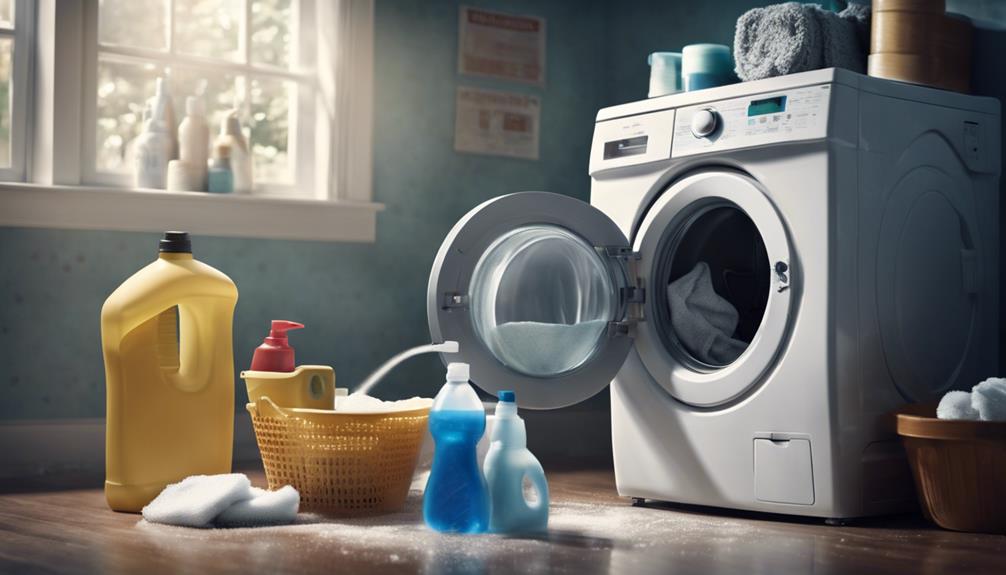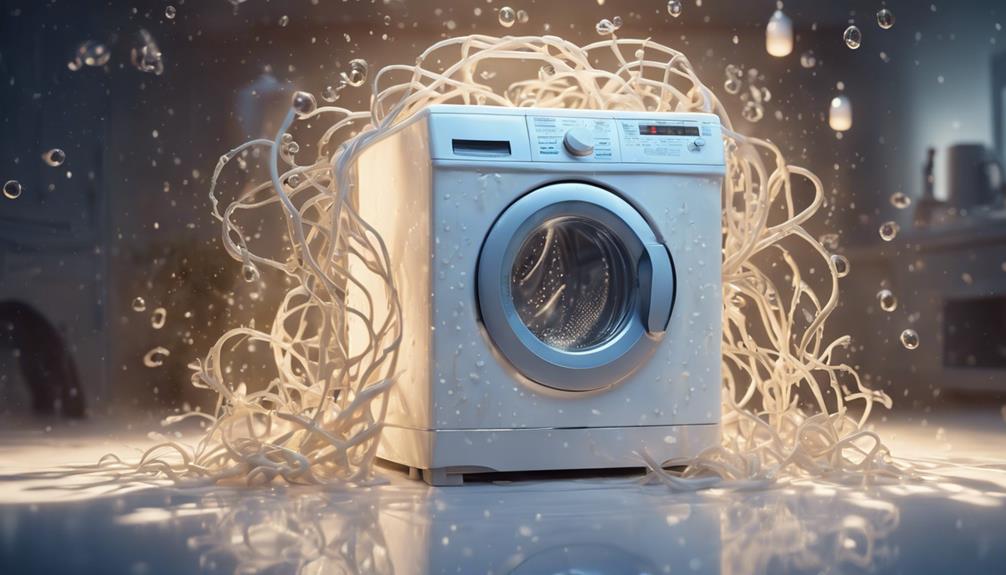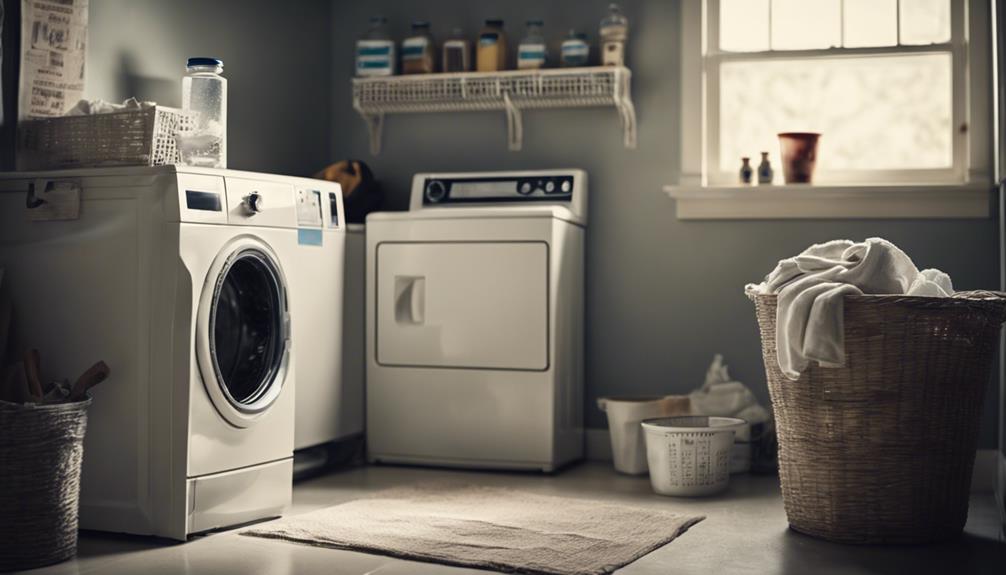You can clean your washing machine using vinegar by preparing it beforehand, then running a cycle with distilled white vinegar. Remove all items, including detergent dispensers, and check your manufacturer's guidelines. Vinegar is a natural cleaner that dissolves mineral deposits, kills bacteria and fungi, and removes detergent residues. For top-loading washers, conduct regular vinegar cycles for maintenance and wipe down the exterior with warm, soapy water. To learn the specifics of cleaning your washing machine, including benefits, techniques, and tips, take the next step and discover how to keep your machine running smoothly and smelling fresh.
Preparing Your Washing Machine
Before you start cleaning your washing machine with vinegar, empty it completely and remove all items, including detergent dispensers, to guarantee a thorough cleaning process. This step is vital to make sure you're starting from a clean slate.
Next, check your manufacturer's guidelines to confirm that using vinegar is safe for your specific washing machine model. You don't want to risk damaging your appliance.
When preparing your washing machine for cleaning, you'll need distilled white vinegar. You can dilute it with water in a spray bottle for easy application on surfaces inside the machine. Have a microfiber cloth or sponge ready to wipe down the interior drum, rubber seals, and other components. This will help loosen any dirt and grime.
Running a hot water cycle with vinegar will help dissolve mineral deposits and remove odors from the washing machine. By following these steps, you'll be well on your way to a fresh, clean washing machine.
Cleaning Top-Loading Washers
Now that you've prepared your washing machine, it's time to tackle the task of cleaning your top-loading washer.
You'll be removing odor buildup, reaping the benefits of a vinegar cycle, and giving your washer drum a thorough cleaning.
Removing Odor Buildup
To keep your top-loading washer smelling fresh, you need to tackle the root of the problem: the odor-causing buildup that accumulates over time. This buildup is a breeding ground for bacteria, which thrive in the moist environment of your washing machine. As a result, unpleasant odors start to emanate from your washer, making it essential to remove this buildup regularly.
Vinegar is an effective natural cleaner for removing odor-causing buildup in top-loading washing machines. The acetic acid in vinegar dissolves mineral deposits and bacteria that contribute to unpleasant smells.
To clean your top-loading washer with vinegar, run a hot water cycle with two cups of white vinegar. Make sure all detergent dispensers are free of residue before using vinegar to clean your washer.
Regularly cleaning your top-loading washer with vinegar can help prevent odors and maintain machine efficiency. By removing the buildup, you'll keep your washer smelling fresh and running efficiently. This simple cleaning routine can make a huge difference in the performance and longevity of your washing machine.
Vinegar Cycle Benefits
By incorporating a vinegar cycle into your maintenance routine, you'll reap numerous benefits that extend beyond simply eliminating odors. The acetic acid in vinegar is a powerful tool in maintaining your top-loading washer's cleanliness and performance.
Here are just a few benefits you can expect from regular vinegar cycles:
- Mold prevention: Vinegar's antimicrobial properties help prevent the growth of mold and mildew, keeping your washer fresh and clean.
- Detergent and fabric softener removal: Vinegar effectively removes residue left behind by detergents and fabric softeners, ensuring your washer stays free of built-up debris.
- Bacteria and fungi elimination: The acid in vinegar kills bacteria and fungi that can cause unpleasant odors, leaving your washer smelling fresh and clean.
Cleaning Washer Drums
You'll want to tackle the task of cleaning your washer's drum regularly to maintain its performance and hygiene. To do this, set your top-loading washer to its hottest and longest wash cycle available. Next, add two cups of distilled white vinegar directly to the drum. This will help dissolve mineral deposits and soap scum that can affect your washer's performance and leave unpleasant odors. Make sure to empty all detergent dispensers before running the cycle, as any remaining detergent can hinder the vinegar's effectiveness.
As the hot water cycle runs, the vinegar will work to break down and remove buildup and odors from the washer drum. After the cycle is complete, take a few minutes to wipe down the exterior of the washer with warm, soapy water. You can use an all-purpose cleaner if needed.
Cleaning Front-Loading Washers

Cleaning your front-loading washer regularly can prevent mold, mildew, and odors from building up inside the machine. To deep clean your front-loading washing machine, follow these simple steps:
- Prepare the washer: Empty all dispensers and add 2 cups of vinegar to the detergent compartment.
- Run the cleaning cycle: Select the appropriate cleaning cycle or the longest wash cycle with hot water for best cleaning results.
- Clean the dispenser drawer: Thoroughly rinse and clean the dispenser drawer to remove any build-up or residue.
After the cleaning cycle, run a final rinse to make sure all debris is removed from the machine.
Finish by wiping down the outside of the washer with hot, soapy water to keep it looking clean and fresh.
Remember to check and clean the rubber seal around the lid to prevent mold and mildew buildup.
Benefits of Vinegar Cleaning
Using vinegar to clean your washing machine offers several benefits that make it a great addition to your regular maintenance routine. For one, the acetic acid in vinegar effectively dissolves minerals that can build up in your washer drums and hoses, leaving your machine spotless.
Additionally, vinegar's acidity helps kill bacteria and fungi that can cause unpleasant odors in your washing machine. You don't have to worry about safety, either – vinegar is gentle on your clothes and rinses away easily, making it a safe choice for cleaning your washer.
Using vinegar in the rinse cycle also helps maintain the cleanliness of your washing machine over time. It effectively removes detergent and fabric softener residues, leaving your machine fresh and clean.
How Vinegar Works Magic

As you pour vinegar into your washing machine, its acetic acid gets to work, breaking down and dissolving mineral deposits, killing bacteria and fungi, and removing residue buildup. This natural cleaner is a powerhouse when it comes to keeping your washing machine clean and fresh.
Here are just a few ways vinegar works its magic:
- Kills bacteria and fungi: Vinegar's acetic acid helps eliminate the bacteria and fungi that cause unpleasant odors in your washing machine.
- Removes detergent and fabric softener buildup: Vinegar effectively breaks down and removes residue from detergent and fabric softener, leaving your washing machine clean and free of buildup.
- Dissolves mineral deposits and residues: Vinegar's acetic acid dissolves mineral deposits and residues, helping to keep your washing machine's hoses and drums clean and clear.
Vinegar Vs Bleach Cleaning
As you consider cleaning your washing machine, you're likely wondering whether to use vinegar or bleach to get the job done.
You'll want to weigh the natural sanitizing power of vinegar against the harsh chemical dangers of bleach.
Natural Sanitizing Power
When it comes to sanitizing your washing machine, you're likely deciding between vinegar and bleach, but vinegar's natural sanitizing power makes it the clear winner in this showdown. Vinegar's acetic acid effectively dissolves minerals in your washer's drum and hoses, leaving your machine clean and free of buildup.
Here are just a few reasons why vinegar stands out as a sanitizing powerhouse:
- Kills bacteria and fungi: Vinegar's natural properties help eliminate the bacteria and fungi that cause unpleasant odors in your washing machine.
- Removes residues: Diluted vinegar can effectively remove detergent and fabric softener residues from your washer without damaging its components.
- Safer for the environment: Unlike bleach, vinegar is a safer, more environmentally friendly option that won't harm your clothing or the environment.
Before you start cleaning, be sure to check your manufacturer's recommendations to guarantee compatibility and avoid voiding your warranty. By choosing vinegar, you're opting for a natural, effective, and gentle way to sanitize your washing machine.
Harsh Chemical Dangers
Your washing machine is vulnerable to the harsh effects of bleach, which can damage its rubber seals and components over time, making vinegar a safer alternative for cleaning.
You might be tempted to use bleach to tackle tough odors and stains, but it's essential to consider the harsh chemical dangers it poses to your machine. Bleach can erode the rubber seals and components, leading to costly repairs or even replacement.
In contrast, vinegar is a non-toxic and environmentally friendly option that effectively dissolves mineral deposits, removes odors, and eliminates detergent residue in the washer drum. Unlike bleach, vinegar is gentle on fabrics and won't leave a strong chemical smell after cleaning.
Maintenance and Tips

To keep your washing machine in top shape, incorporate regular vinegar cleanings into your maintenance routine. This will help prevent mold, mildew, and odor buildup, ensuring your clothes come out fresh and clean.
Here are three essential tips to keep in mind:
- Clean your washing machine regularly: For top-load washers, aim to clean with vinegar at least four times a year. For front-load washers, clean monthly to maintain efficiency and cleanliness.
- Check and clean the rubber gasket: Regularly inspect and clean the rubber gasket to prevent bacterial growth and unpleasant odors.
- Add an invigorating twist: Consider adding a few drops of your favorite essential oil to the vinegar solution for a fresh, clean scent.
Deep Cleaning Essentials
Periodically, you'll need to perform a deeper cleaning of your washing machine to tackle tough buildup and lingering odors. This is where vinegar comes in – a natural and safe cleaning agent that's gentle on clothing and the environment. To deep clean your washing machine, you'll need to use vinegar to dissolve mineral deposits, kill bacteria and fungi, and eliminate odors.
Vinegar is also effective in removing residue from detergent and fabric softener, which can affect your washer's performance over time.
Regular deep cleaning with vinegar will prevent the need for frequent maintenance and keep your washing machine running smoothly. By using vinegar, you'll be able to remove tough buildup and residue that can cause odors and affect the quality of your laundry.
Conclusion
As you close the lid on your freshly cleaned washer, the sweet scent of vinegar lingers, a reminder that sometimes, it's the small coincidences that lead to a deeper cleaning.
Just as vinegar breaks down tough stains, it also reveals the hidden grime within.
And just as your washer's fresh start mirrors your own, perhaps it's time to reflect on the dirt we harbor within ourselves, waiting to be washed away.